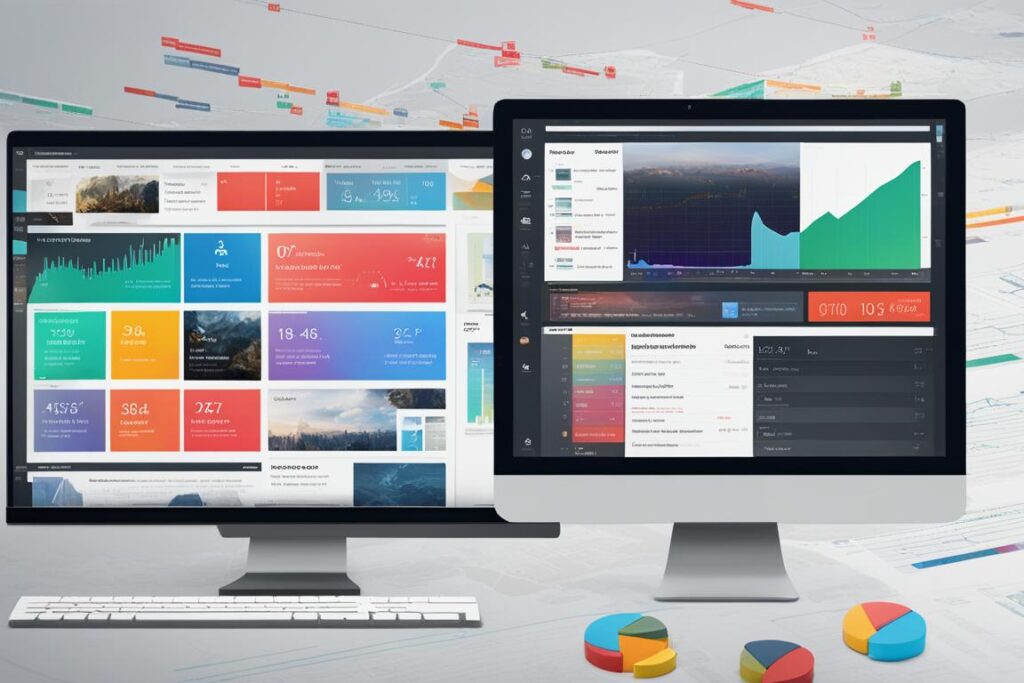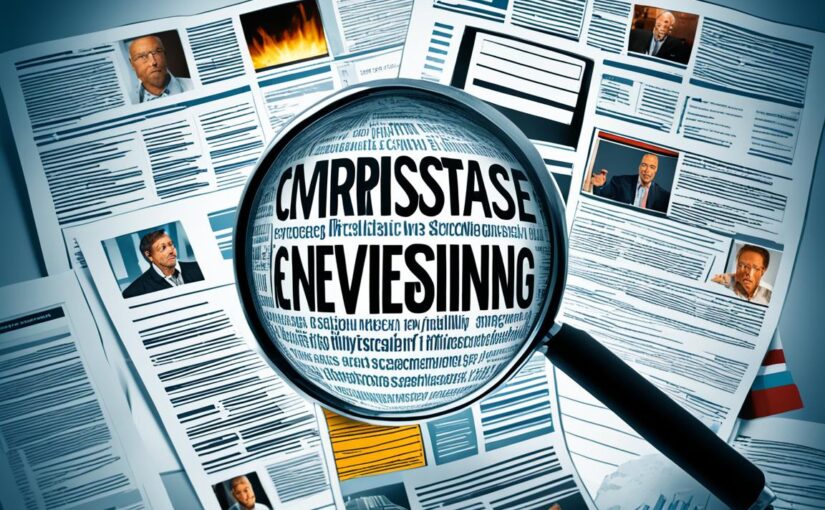In the context of today’s global economy, conducting thorough due diligence is essential for businesses seeking to mitigate risks associated with their operations. Conducting robust risk assessments and reputational assessments can help identify potential risks before they become actual threats. This is where Adverse Media Screening comes into play.
Adverse Media Screening involves identifying negative news articles, blog posts, and other content that could pose a risk to an organization. By incorporating Adverse Media Screening into their due diligence processes, businesses can more effectively identify these potential risks and take appropriate action to mitigate them, thus enhancing their overall risk management strategy.
Key Takeaways:
- Adverse Media Screening is a critical tool for enhancing due diligence processes.
- Conducting Risk Assessments and Reputational Assessments is crucial for identifying potential risks before they manifest.
- Adverse Media Screening can help organizations efficiently identify and mitigate risks by analyzing negative news articles and other related content.
- Adverse Media Screening is particularly relevant in the Romanian context, where businesses face unique challenges and complexities.
- Choosing the right Adverse Media Screening Solution requires careful consideration and investment in effective media monitoring software.
What is Adverse Media Screening?
Adverse media screening is a process of identifying negative news or information associated with an individual or entity. It is an essential component of enhanced due diligence and risk screening, particularly in Romania. Through media monitoring, adverse media screening identifies potential reputational risks and helps to minimize them.
Media monitoring software scans various media sources such as news articles, blogs, and social media to identify potentially negative information related to a particular individual or entity. The screening process includes risk assessments, reputational assessments, and media risk assessments, providing a comprehensive analysis of potential threats.
Enhanced due diligence incorporates adverse media screening into its framework to thoroughly understand an individual or entity’s background within a specific context. This screening can help prevent financial crime and regulatory violations by identifying potential red flags early.
The Importance of Adverse Media Screening in Due Diligence
Adverse media screening is essential to enhance your due diligence. Through this process, you can conduct risk assessments and reputational risk assessments effectively. Utilizing media screening software helps you efficiently identify potential risks and negative news associated with a company. Incorporating such screening in your due diligence process is vital.
With adverse media screening, you can conduct thorough risk assessments that identify significant areas of concern and evaluate risks associated with negative news. Moreover, reputational risk assessments ensure that the company’s image and standing are not compromised. This process helps mitigate against any potential risks that may arise in the future and safeguards the reputation of the company.
The use of media screening software is a useful tool in identifying and assessing potential risks associated with negative news. This software is designed to identify patterns and consistently flag articles with negative sentiment, helping you efficiently and effectively screen your media mentions.

How Does Adverse Media Screening Work?
Adverse media screening is a process that involves monitoring media sources to identify and analyze negative news related to individuals, companies, or organizations. This process typically involves media monitoring software that continuously scans various media sources such as news outlets, social media, and public records.
The first step in adverse media screening is media monitoring, which involves collecting vast amounts of information from different sources. The collected data is then filtered using certain keywords and parameters to focus on relevant information such as negative news or mentions related to the subject being screened. The filtered data is analyzed using risk screening techniques, which involve classifying the type and severity of the negative news or mentions.
The results of the risk screening process are then evaluated, and relevant information is included in a comprehensive report. The report provides insights into any potential risks associated with the subject being screened.
Effective adverse media screening requires a sophisticated media monitoring software that can accurately filter and classify vast amounts of data. The software should allow for customization of keyword searches and risk screening parameters to ensure that the results are relevant and accurate. Additionally, human expertise is needed to analyze the results and provide additional context.
Factors to Consider in Adverse Media Screening
When conducting adverse media screening, several critical factors should be considered to ensure a comprehensive analysis of risks and potential threats.
The Importance of Risk Assessments
The initial stage of screening should involve conducting thorough risk assessments to identify potential risks associated with negative news and media mentions. This process involves evaluating the likelihood and severity of potential risks and understanding how they may impact the organization’s operations.
The Significance of Reputational Risk Assessment
Reputational risk assessment is also a crucial factor in adverse media screening, as negative news can significantly impact a company’s reputation. Conducting a reputational risk assessment requires the organization to consider how negative media could harm its brand image, customer relationships, and stakeholder trust.
The Value of Media Risk Assessment
Another factor to consider is media risk assessment, which involves analyzing media sources and evaluating the reliability and credibility of the information presented. This step ensures that only accurate and relevant information is included in the screening process.
By considering these factors in the adverse media screening process, organizations can effectively identify and mitigate risks and enhance their due diligence practices.

Best Practices for Effective Adverse Media Screening
Adverse media screening is a critical component of a robust due diligence process. To conduct effective screening, it is essential to follow best practices that enable thorough risk assessments and reputational assessments.
One of the most critical elements of effective screening is utilizing media monitoring tools. These tools enable you to stay up-to-date with the latest news and information related to your organization and identify potential risks and red flags immediately.
In addition to media monitoring, employing proper risk screening techniques is also essential. This involves analyzing potential risks associated with negative news and assessing their potential impact on your organization.
Another best practice is integrating screening into enhanced due diligence processes. By aligning screening with these processes, you can ensure that all relevant information is considered and that the findings are appropriately addressed.
Overall, implementing these best practices can enhance your adverse media screening efforts and enable you to conduct more effective due diligence.
Regulatory Requirements for Adverse Media Screening
In Romania, financial institutions and businesses are required to perform adverse media screening to comply with anti-money laundering (AML) regulations.
Adverse media screening is a crucial component of a robust AML program. Specifically, it helps companies identify and mitigate potential financial crime risks associated with negative news, media reports, and adverse information.
Recent regulations mandate that businesses establish an effective and comprehensive risk assessment program. This program must identify, analyze, and assess the risks associated with customers, transactions, and geographic locations.
The risk assessment must also consider the potential risks associated with adverse media, which may harm a company’s reputation. Therefore, AML screening is essential in ensuring compliance with regulations, mitigating risks, and maintaining a company’s reputation.

Effective implementation of AML screening necessitates the deployment of media screening software. Such software helps organizations stay current with the latest developments in the regulatory landscape.
With the right screening solution in place, businesses can conduct efficient and effective AML screening, thereby ensuring compliance with all regulatory requirements.
Adverse Media Screening in Romania
Adverse media screening is a crucial component of due diligence processes in Romania. Conducting thorough risk assessments and reputational assessments is integral to mitigating risks and ensuring compliance with legal and regulatory requirements.
Reputational assessments through media monitoring help to identify any negative news surrounding a company or individual and mitigate potential adverse impacts on business operations in Romania. In addition, proper media screening software can lead to more efficient and effective screening processes.
“In Romania, it is essential to apply adverse media screening to enhance due diligence practices and ensure compliance with local regulations. This screening helps to safeguard business operations and reputations in an increasingly complex global market.”
-Maria Popescu, Risk Management Consultant
Overall, implementing adverse media screening in Romania can help businesses to stay competitive and legally compliant in a dynamic market. It is important to consider the unique context and focus on thorough risk assessments and reputational assessments to effectively mitigate risks.
Choosing the Right Adverse Media Screening Solution
Adverse media screening is a critical component of enhanced due diligence and risk assessments. Choosing the right media screening software is key to ensuring the screening process is effective and efficient. Here are some considerations when selecting an adverse media screening solution:
- Accuracy: It is important to choose a tool that has a high level of accuracy in identifying and categorizing adverse media mentions. Look for solutions that utilize advanced algorithms and natural language processing capabilities to enhance accuracy.
- Customization: Every organization has different needs and requirements for adverse media screening. Therefore, it is essential to find a solution that can be tailored to specific use cases and risk profiles.
- Integration: Adverse media screening should be integrated into enhanced due diligence processes seamlessly. Look for solutions that can be easily integrated into existing workflows and due diligence platforms.
- User-friendly interface: A user-friendly interface is essential to ensure efficient and effective screening. Choose a solution with an intuitive and easy-to-use interface that enables quick and accurate analysis of adverse media mentions.
By considering these factors, organizations can select the right adverse media screening solution to support effective due diligence and risk assessments.






